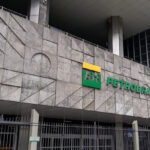From Reuters
A University of Chicago-trained economist named on Monday to head Brazil’s Petrobras will not privatize the state-run company, but wants to push ahead with selling non-core assets and to focus on oil exploration and production.
Brazil’s incoming far-right government announced Roberto Castello Branco as the next chief executive of Petroleo Brasileiro SA (PETR4.SA), amid a debate over how far to pursue asset sales at the indebted company, Latin America’s largest by market capitalization.
Castello Branco’s appointment is the latest in a string of market-friendly selections by President-elect Jair Bolsonaro, many of them influenced by his adviser and future Economy Minister, Paulo Guedes.
The appointments have raised hopes among investors that the former army captain, who takes office on Jan. 1, will deliver significant reforms needed to improve Brazil’s creaking public finances, including a pension overhaul.
Castello Branco, who in the past has spoken in favor of privatizing Petrobras, on Monday said he had not been tasked with selling off the company but signaled his intention to cut costs, do away with some of the company’s downstream operations and focus on its core business.
“The privatization of the company is not in question. I do not have a mandate to think about it,” he told the Folha de S. Paulo newspaper, adding that he expected Brazil’s Supreme Court to approve a path enabling the company to continue selling assets such as majority stakes in two blocks of refineries and in a gas pipeline company.
In an earlier interview, with the O Estado de S. Paulo newspaper, he said BR Distribuidora (BRDT3.SA), Petrobras’ fuel distribution unit, was not a natural fit for the company and does not generate returns, sending its shares up almost 6 percent as investors bet the government may sell its 70 percent stake in the unit.
Castello Branco also said he would consider all current asset sales, including that of liquid petroleum gas distribution company Liquigas.
“Petrobras’ competence is in oil exploration and production,” he told the newspaper.
Guedes has advocated a full privatization of the company while military generals around Bolsonaro oppose such an idea.
Underlining that tension, Bolsonaro told reporters on Monday that certain units of Petrobras could be privatized, even though the company is deemed strategic for the nation.
CHICAGO BOYS
Castello Branco, a one-time post-doctoral fellow at the University of Chicago, will join other school alumni in the ranks of the incoming administration, including Guedes and former Finance Minister Joaquim Levy, who has been tapped to lead Brazil’s powerful state development bank, BNDES.
Chicago’s economics department has long been known for orthodox economics, particularly in Latin America, and much of Brazil’s business elite is enthused by the prospect of Chicago-linked appointees in top posts in public administration.
“We basically have the University of Chicago economics department taking over the Brazilian economy,” said James Gulbrandsen, chief investment officer for Latin American investments at NCH Capital, welcoming Castello Branco’s appointment.
“He’s been public in the past about advocating for less government intervention … all the way to privatizing parts of Petrobras.”
Castello Branco, a member of Petrobras’s board until 2016, has also held executive positions at Brazil’s central bank and at iron ore miner Vale SA (VALE3.SA).
“We expect Petrobras’ deleveraging process and divestment program to continue under Castello Branco’s tenure,” Vincente Falanga and Oscar Camilo, analysts at Banco Bradesco BBI, wrote in a note to clients.
CHALLENGES AHEAD
Petrobras, which is burdened by some $88 billion of gross debt, has played a leading role in developing a bonanza of deep-water oil finds in recent decades.
Castello Branco told Folha that the company would now double-down on that strategy, seeking to maximize potential of the so-called pre-salt deep-water area.
“We need to seize this wealth while there is time. In some decades, oil will lose the relevance it has today,” he said.
Petrobras is a source of national pride for many Brazilians, but its central role in Brazil’s “Car Wash” investigation, considered by many to be the world’s largest corruption probe, has hurt its public image and bottom line in recent years.
Preferred shares of Petrobras rose 0.8 percent after experiencing swings during the day, while Brazil’s benchmark Bovespa index .BVSP fell 0.7 percent.
Bolsonaro on Monday said that Petrobras’ outgoing boss, Ivan Monteiro, could go to state-run Banco do Brasil, the country’s largest, although no decision has been made. Petrobras said Monteiro would leave his post on Jan. 1.







